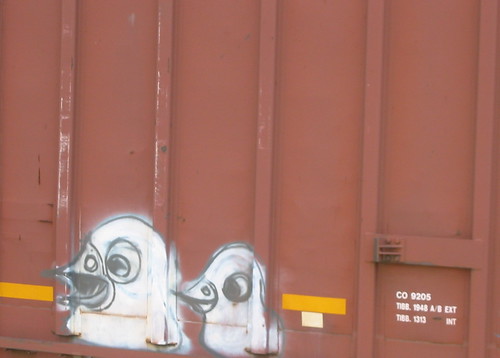
Two Ducks
Funny to see Ron Silliman trying to keep the rivers running smoothly between terribly (futilely) preconceived banks. Levity all along the levee to see a bald-head’d monkey hoisting sandbags (full of New Sentences) in massy incontinent effort to prevent a (prematurely “bagged”) legacy getting wash’d off and away by a paradigm shift. Silliman’s hubbub is that suddenly there be “two contending (contesting) approaches to the new, and that you can actually feel the discourse getting off the dime . . . clear as sunlight in spring.” Although the “contending” amounts to Kenneth Goldsmith smarming it on, and K. Silem Mohammad laughing it off, that’ll never harry the Decider. He says (in the bullet prose of a marketing newsletterist):
Flarf is Projective VerseThe Flarfist groupuscule mimicks the ’fifties Projectilists, how quaintly asinine is all one registers there. Google = Jung. Muthos is a sample. One is engaged less in studying history (or hunger) and more in pawing at the greasy entrails thrown up out of the machine Moloch-Google. And the conceptualist bottom-feeders mocking the No Work School in whatever incarnation?—tell it to Elsie the Borden’s cow. Wit cow’d by constraint does rarely an Abstract-Expressionist wit make, nor a Pop one. Silliman’s like Joe McCarthy looking for Communists under rocks, looking for collectives. A history of groupuscules and other such “organs” redeems and justifies, of course, the hideously personalized “history” Silliman’s so adept at making (and, unbelievably, believing—if one’ll allow the kernel of impossibility such a construction holds in its hairy paw, single huckleberry to a bear.) The Actualists provided one summer’s fun and an anthology or two; the New Brutalists amount’d to a few fey Californians (it’s always the fey Californians) thinking they’d make a joke out of an Ashbery line, never perceiving that Ashbery’d already beat ’em to the punch (with ’s usual shy and nonchalant historical accuracy); the New Yipes appear’d on a few posters, fey and melodramatic; the Criminy collective bit the dust in the garage it inhabit’d; le collectif Zut—probably the finest formation “artistically”—left its considerable “output” (in the years before “throughput”) tack’d to the ink-splatter’d walls of its cellar print shop, North Plain Street, in Ithaca, New York. To say nothing of the Constantly Yattering Hegemonists, or the Repeat Offenders, or the Sheep in Wolf Clothing (tendency academickal)—all the collectives without signatories who “operate” (fill’d with operators they be) like precinct bosses, unchallenged. I like gaslighting the gullible just as well as the next jerk along the turnpike (that Aunt Jemima’s syrup cut with a little water in the bourbon bottle perplect’d more ’n one dancehall hombre in my day), but I’d never think to make a career of it, inserting myself (and my coevals, my “we”)—is it history’s cotter pin or history’s lynchpin—into a paltry series of half-built collective structures, most disavow’d by even the participants, isolatos by any half-exacting measure. As if la poésie court’d (count’d on) a team structure, formal sequences of collusion and contention (complete with daily calisthenics). Collective formation is mostly the refuge of the meek and mediocre, safety in numbers, the numbers demarcating the footnotes such bulky and artificial suasions’ll receive, assured in the annals of they tiny spot.
Conceptual Poetry is the New York School
—
My word, as Archie Ammons liked to say, no particular ownership intend’d. What if language—what one binds oneself to, what one is pull’d by down a river whose banks, unseen, unregister’d, formidable, change mightily in the drift and haul—what if language is “homely and mysterious as grass.” Words I read in a book. Stuck in the craw of the brain (that beast, that glutton, that semblable). Language is a multiple, porous, murmurous, nebulous, fogged in by itself. See Michel Serres:
The multiple as such. Here’s a set undefined by elements or boundaries, Locally, it is not individuated; globally, it is not summed up. So it’s neither a flock, nor a school, nor a heap, nor a swarm, nor a herd, nor a pack. It is not an aggregate; it is not discrete. It’s a bit viscous perhaps. A lake under the mist, the sea, a white plain, background noise, the murmur of a crowd, time.Language is time itself. With all the excess and pomp of its frittering, expungible and indelible à la fois. A flounce, a bulge, a turbulence, massy and particulate. Omnidirectional. (The model of Volišinov / Bakhtin in Marxism and the Philosophy of Language, the “stream of speech” one dips into, becomes inaccurate here.) So that: force (control) is inapplicable—transformation of a multiple calls for a multiple. A multiplicity of isolatos plunging into the ongoing dispersal—cloud wedding cloud. Serres:
The real work toward transformation is not the work of the negative, for the work of the negative bolsters the old order, maintains it in its order, and makes time linear. Control confirms the role, a counterforce protects the force, and none is so conservative as the teenager who has grown old, outgrown his rebellion against the father. We suffer as much from governments born of revolution as from those that backed us into them. We suspect them of driving us to it to be able better to maintain themselves, under a second façade. What is called dialectics is a rather crude trick of the straight line’s, a logic of carefully placed invariants.“Carefully placed invariants”: think of the phrase—undefined and repeatedly hammer’d home—“School of Quietude.” Shriners, Freemasons, B.F.O.E.’s, Langpo’s, Rotarians. Boys without clubhouses in they youth, “compensating.” (My word, as Archie Ammons liked to say, no particular ownership intend’d.)
The work of transformation is that of the multiple.
